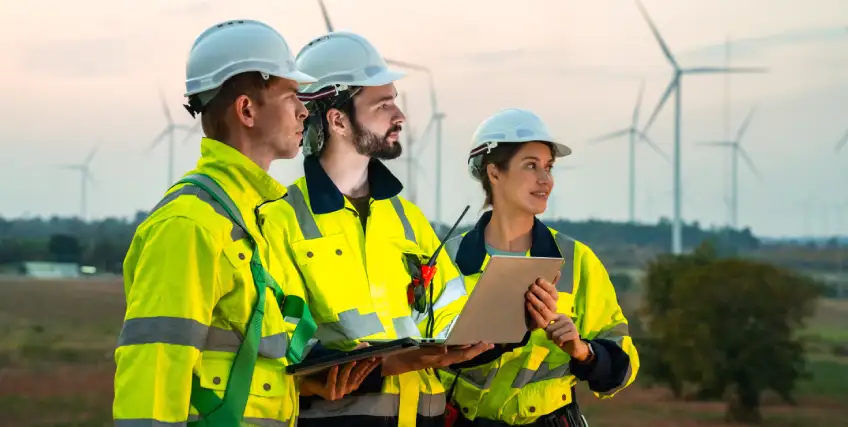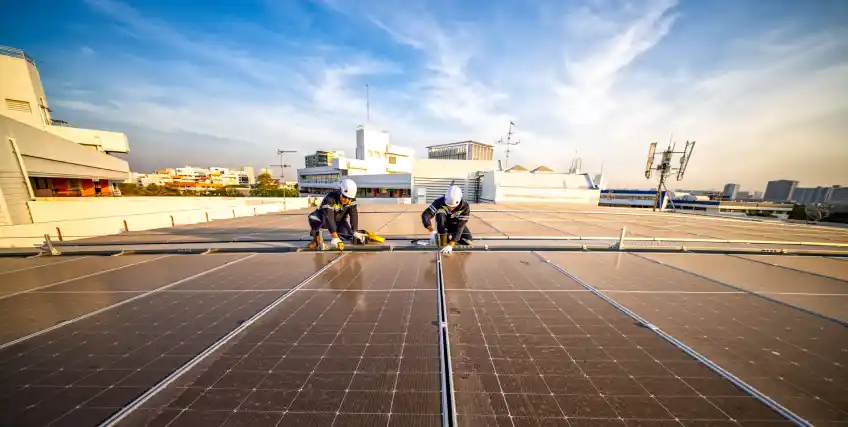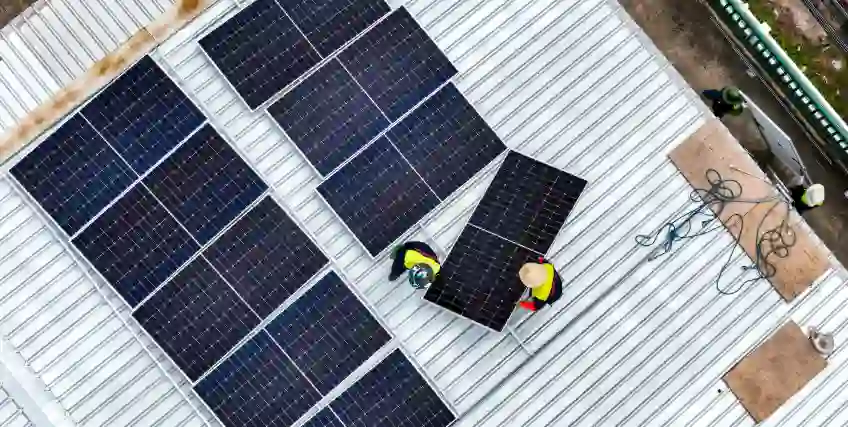Popular Financing Options for Your Next Commercial Energy Project
Jul 11, 2025 | Last Updated on: Jul 14, 2025

As costs continue to rise and the climate impact is felt more broadly, many businesses are putting a greater emphasis on sustainability. The goal is to reduce greenhouse gases and turn to alternative energy sources, such as wind or solar energy. These efforts can help the planet and may result in savings over the long term.
However, if you want to pursue renewable energy projects like installing solar panels at your office or implementing a battery storage system, your upfront costs will be substantial. The steep investment could make it out of reach. However, you have a range of energy project financing options to consider.
Energy Project Financing Options
Whether your goal is to reduce emissions or focus on energy efficiency, transitioning to more sustainable solutions can be a large-scale project. The project costs can be incredibly high. Turning to energy project financing options can help. Below we cover what types of renewable energy project funding are available.
Green Energy Loans
Green energy loans, or green loans, are a type of financing available to pay for projects focused on sustainability. The funding options may come from the government, financial institutions, or alternative lenders.
For it to be a green loan, it typically needs to meet the four Green Loan Principles set by the International Capital Market Association (ICMA), according to the World Bank Group.
- Use of proceeds: The green project should have a clear and measurable benefit to the environment.
- Process for project evaluation and selection: The borrower must communicate the process behind choosing projects and a plan for risk mitigation.
- Management of proceeds: The green loan proceeds must be tracked by the borrower and have transparency or be put in a specific account.
- Reporting: Both quantitative and qualitative measures and indicators should be used to report the efficacy of the project.
In July 2024, the Green Lender Initiative was announced on the SBA.gov website. The aim of the initiative was to enroll new climate lenders in the Small Business Administration (SBA) loan programs. That way, the agency can support small business owners to reach their sustainability and climate goals.
The current administration has paused the Green Lender Initiative, Recently, the SBA has undergone many changes due to an agency-wide reorganization, according to a press release in March 2025.
As you’re looking into energy project financing options, traditional banks, credit unions, online lenders, and so-called green banks may be your best bet.
Power Purchase Agreements (PPAs)
Power purchase agreements or PPAs have become one of the most prominent energy project financing options, especially for solar projects.
Through power purchase agreements, a third-party developer will install an energy system on the buyer’s property. The buyer enters into an offtake agreement with the developer to purchase the energy for a set period of time. This could be long-term, up to 10 to 25 years. Generally, the energy comes from renewable sources like wind or solar.
This arrangement is mutually beneficial for both parties. The developer earns revenue for the energy purchased. The buyer typically gets affordable electricity at a predictable rate. That means it provides an affordable pathway to clean energy, without all of the upfront costs of installing a system yourself.
Once the contract is up, buyers typically have the option to renew the contract, remove the equipment, or purchase the system.
Before looking into this type of energy project financing, check your eligibility. To qualify, you must live in an area or state that allows energy generation equipment from a third-party owner. You can check your state information through the Database of State Incentives for Renewable Energy (DSIRE).
Government Incentives
Certain tax credits and government incentives can make it easier to get energy project financing. The Investment Tax Credit (ITC) makes tax equity partnerships appealing. Investors in solar energy and wind may be eligible for a one-time tax credit up to a specific percentage of the investment. However, the future of these tax credits is up in the air. The EPA.gov website states that the Inflation Reduction Act extends the Investment Tax Credit to at least the end of 2025.
The site also notes that the Investment Tax Credit, as of January 1, 2025, has been replaced with the Clean Electricity Investment Tax Credit. According to the site, they’re functionally similar but are not specific to a certain technology.
You can also look into any local and state tax credits and other benefits available. This may help offset some of the energy project financing costs. For example, New York State has the New York State Real Property Tax Exemption. So if your business’s property value increases due to a solar installation, you may qualify for an exemption, so you don’t pay more property taxes.Private Investors
If you need energy project financing, you can also turn to private investors. This is often referred to as equity financing. In exchange for capital, you also release shares of ownership. If you’re in the early stages of project development, having equity financing can get you the capital you need without immediate repayment.
While that can be helpful in the short term, consider the long-term consequences as well. Having multiple stakeholders involved as investors can dilute ownership and control.
How to Decide Which Energy Project Financing Option is Best
Focusing on clean energy can be an undertaking, and you want the right funding option. To decide which energy project financing is best for your needs consider:
- Cash flow: Look at your current cash flow and understand how taking on any financing may affect that in both the short term and long term.
- Upfront costs: Depending on the project, you may have significant costs. You want to know how much you’ll need and have a plan for repayment.
- Credit history: Lenders want creditworthy borrowers who can make good on their investment and repay the loan.
- Timing: Consider the time investment as well. If you go with a power purchase agreement, that can be long-term. You might be looking at 10 to 25 years.
- Ownership: Evaluate your desire for control and full ownership. If you want 100 percent autonomy, then private investors are probably not the best option.
- Incentives: Research and review local, state, and federal incentives that may provide certain tax benefits.
- Repayment: Different projects have different repayment structures. Consider the pros and cons of each option and think about how each will fit into your overall business plan.
Taking the time to weigh these various factors can help you make a well-informed decision. Before moving forward, understand the processing and funding timelines. Some options may be faster than others, so if your project is time-sensitive, that’s a major part of the equation.
Final Thoughts
You might have big plans for your next commercial energy project. But you’re stuck on how to fund it. Multiple energy project financing options exist to help the sustainability of both your business and the planet. Before securing any outside investments or loan options, do your due diligence. Have a plan and understand the numbers behind the project. Consult with clean energy professionals who can help walk you through the process and help you get the financing you need.
FAQs about Energy Project Financing Options
If you have more questions about different energy project financing options, find more information below. You can also look into state and local resources for renewable project finance options.
Where Can You Get Energy Project Financing?
You can get renewable energy project financing from banks and online lenders, private investors, government programs, and other project sponsors. The type of financing can vary from green loans to investors and power purchase agreements.
How Do Renewable Energy Projects Get Funding
Funding for renewable energy projects can come from loans, private equity investments, green bonds, as well as solar leases and power purchase agreements (PPAs). Look into local and state resources as well.
What Are Power Purchase Agreements (PPAs)?
Power purchase agreements are a type of long-term contract between an energy provider or seller and a buyer, such as a business. Typically, the seller offers the buyer electricity from renewable energy sources. The buyer purchases the energy at a fixed rate without ownership of the system, while the seller has a revenue stream and can take advantage of tax benefits.
Should You Take Out Debt Financing or Equity Investors?
If you’re reviewing your energy project financing options, you might consider debt financing and equity investments. When deciding, consider your cash flow, the interest rates and repayment on any debt financing, and whether maintaining full ownership is a top priority.
What Financing Solutions Are Available for Clean Energy Projects?
Clean energy project financing can be through loans, PPAs, local programs, and potential tax credits. Which option is best for you depends on your goals, needs, and the financing structure that suits your business.




